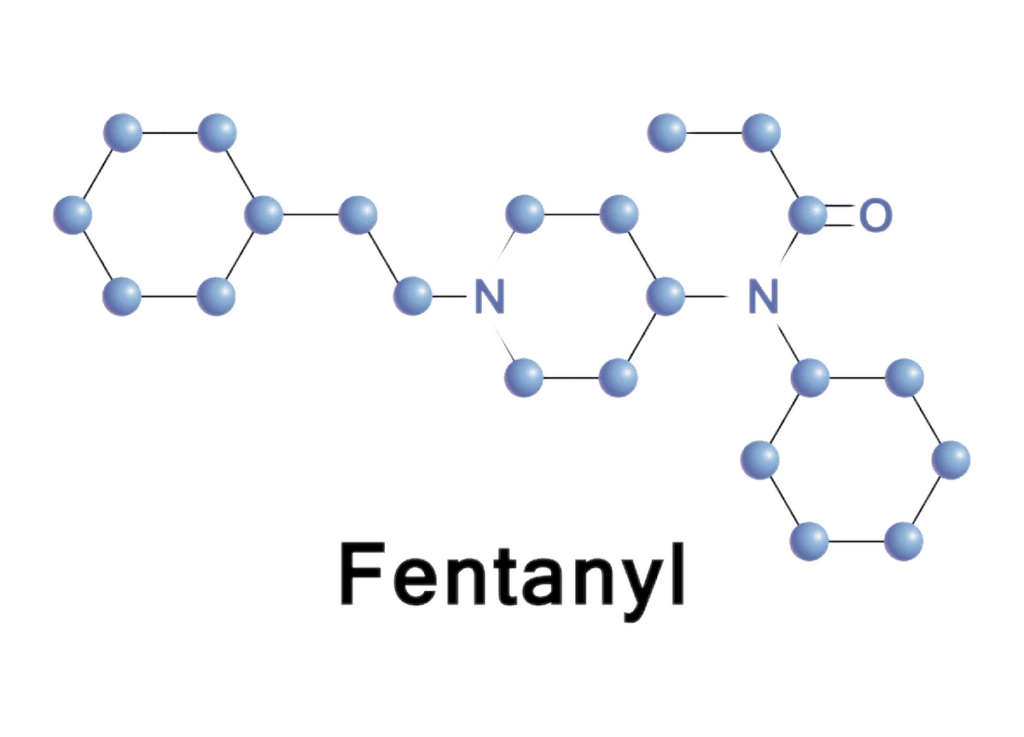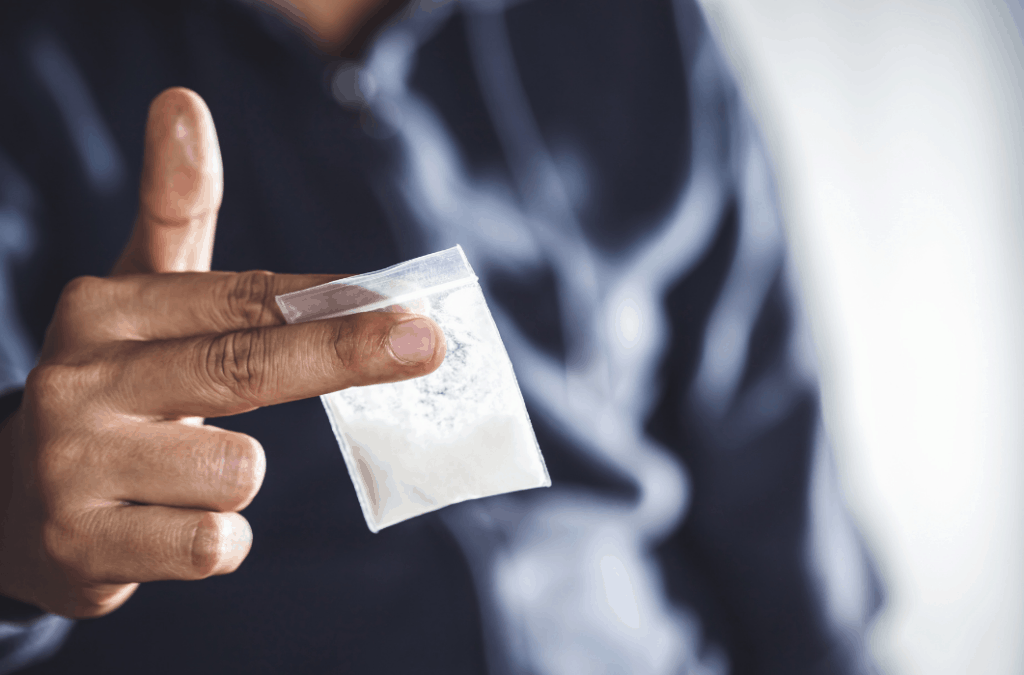What is Fentanyl – How Long Does It Take To Get Addicted?
What is Fentanyl & How Strong Is It?
Fentanyl is a synthetic opioid 50-300 times more potent than morphine. First developed as a pharmaceutical in the 1960s, fentanyl is now also produced illegally and trafficked as a street drug. Since 2017 fentanyl trafficking has increased by 950%. But why is it so addictive?
For starters, fentanyl binds tightly to opioid receptors in your brain that regulate pain and emotions. This flood of dopamine produces an intense high and feelings of euphoria. But it also slows your breathing and heart rate, which is why overdoses are common.

The potency of fentanyl means that even a small dose can lead to addiction. According to estimates, it only takes a few uses of fentanyl to become addicted. In 2021 approximately 539,000 people from as young as 12 years misused prescription fentanyl. This saw a rise in fentanyl-related ER visits, with at least 122,884 people visiting the ER.
Fentanyl’s addictiveness is also enhanced by the fact that tolerance builds up quickly, requiring higher and higher doses to get the same high. This dangerous cycle of increasing doses to chase the high while avoiding withdrawal is what fuels the addiction.
The bottom line is that fentanyl should only be used under medical supervision. On the street, its extreme potency and addictiveness make it an epidemic “hard” drug that often leads to overdose or long term addiction after just a few uses. Be very careful and seek help right away if you or someone you know is struggling with fentanyl addiction. There are treatments and support available 24/7.
What is Fentanyl?
How Fentanyl Works With The Body
When fentanyl enters your body, it works fast. Within minutes, it travels to your brain and attaches to opioid receptors, causing a surge of dopamine that produces an intense high. But fentanyl’s effects are fleeting. Even though it sticks around in your system for over a day, that initial rush wears off quickly.
Once fentanyl molecules are in your bloodstream, they disperse in fat tissue and plasma proteins throughout your body. Primarily, they target μ-opioid receptors in the brain, spinal cord, and other organs. These receptors normally respond to endorphins—the body’s natural painkillers. But when bombarded with fentanyl, they unleash a cascade of effects:

- Pain relief and euphoria: Immediately, fentanyl dulls pain and produces an intense rush of pleasure and well-being.
- Slowed breathing: High doses of fentanyl can slow or even stop respiration, which is how most overdoses occur.
- Drowsiness and sedation: Fentanyl causes extreme relaxation and sleepiness, which is why it’s sometimes used as an anesthetic.
- Nausea and vomiting: Opioid receptors in the digestive tract and brain stem are also impacted, leading to nausea, vomiting, and other issues.
The addictive nature of fentanyl comes from how rapidly it acts and the intensity of that initial high. But the effects fade quickly, and you’re left craving more—a cycle that’s difficult to break without help. The good news is treatment and recovery are possible, but the first step is understanding how this drug hijacks your body and mind.
How Quickly Can You Become Addicted to Fentanyl?
As an opioid, fentanyl binds to receptors in your brain that control pain and emotions. This creates a rapid high and sense of euphoria. Because fentanyl is so potent, the effects are felt almost instantly after ingesting it. The strength and speed at which it works make it so addictive.
Fentanyl is dangerous because someone can quickly become physically dependent on it, sometimes after just a few days of use. Once dependent, stopping use will lead to withdrawal symptoms. The severity of withdrawal depends on factors like:
- How long you’ve been using fentanyl
- The dosage amount
- Whether it’s been used alone or with other drugs
- Your overall health
Someone dependent on fentanyl may experience withdrawal symptoms just hours after the last dose. The acute withdrawal phase can last 1-2 weeks, including symptoms like nausea, vomiting, diarrhea, anxiety, and restlessness. Psychological cravings can last much longer.
The rapid high from fentanyl leads to an equally rapid “crash” that leaves you craving more. This cycle of getting high and crashing creates an addiction that is extremely difficult to break without professional help. The urge to use it again to avoid withdrawal and cravings become all-consuming.
This cycle, combined with increasing tolerance, often leads people to take dangerous amounts to get high, frequently resulting in overdose or death.

Getting Help: Treatment Options for Fentanyl Addiction
Getting hooked on fentanyl can happen quickly, but the good news is several treatment options are available to help you break free from addiction and reclaim your life.
The first step towards recovery is detoxing from fentanyl under medical supervision. Fentanyl withdrawal can be extremely painful and dangerous, so detoxing at a licensed facility with experienced doctors and staff is critical.
They can administer medications to help ease uncomfortable withdrawal symptoms and reduce cravings as the drug leaves your system.
Residential or Inpatient Rehab
For severe addictions or co-occurring disorders, inpatient or residential rehab may be recommended. This involves staying at a treatment facility for an extended period, typically 30 to 90 days. Residential rehab provides intensive therapy and aftercare to help you develop skills and coping strategies to avoid relapse.
Outpatient Treatment
Outpatient treatment involves attending therapy sessions and meetings at a facility during the day but not staying overnight. This level of care works well if you have a strong support system at home and a less severe addiction.
The path to recovery from fentanyl addiction may not be easy, but with the right treatment and support, you can break free from the grips of addiction and live a happy, fulfilling life without relying on drugs. There are people here to help you every step of the way.
Comeback Care Recovery Center Is Here To Help
If you or a loved one are struggling with addiction to drugs such as fentanyl or other substances, reach out to our team today. We have helped thousands of individuals find long term sobriety through our evidence based treatment program. It’s important to understand that you are not in this along. Call us today & begin your recovery journey.


